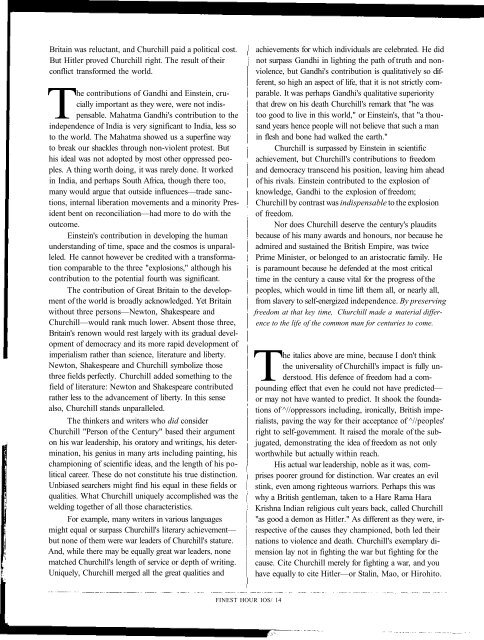journal of the churchill center and societies - Winston Churchill
journal of the churchill center and societies - Winston Churchill
journal of the churchill center and societies - Winston Churchill
- No tags were found...
Create successful ePaper yourself
Turn your PDF publications into a flip-book with our unique Google optimized e-Paper software.
Britain was reluctant, <strong>and</strong> <strong>Churchill</strong> paid a political cost.<br />
But Hitler proved <strong>Churchill</strong> right. The result <strong>of</strong> <strong>the</strong>ir<br />
conflict transformed <strong>the</strong> world.<br />
The contributions <strong>of</strong> G<strong>and</strong>hi <strong>and</strong> Einstein, crucially<br />
important as <strong>the</strong>y were, were not indispensable.<br />
Mahatma G<strong>and</strong>hi's contribution to <strong>the</strong><br />
independence <strong>of</strong> India is very significant to India, less so<br />
to <strong>the</strong> world. The Mahatma showed us a superfine way<br />
to break our shackles through non-violent protest. But<br />
his ideal was not adopted by most o<strong>the</strong>r oppressed peoples.<br />
A thing worth doing, it was rarely done. It worked<br />
in India, <strong>and</strong> perhaps South Africa, though <strong>the</strong>re too,<br />
many would argue that outside influences—trade sanctions,<br />
internal liberation movements <strong>and</strong> a minority President<br />
bent on reconciliation—had more to do with <strong>the</strong><br />
outcome.<br />
Einstein's contribution in developing <strong>the</strong> human<br />
underst<strong>and</strong>ing <strong>of</strong> time, space <strong>and</strong> <strong>the</strong> cosmos is unparalleled.<br />
He cannot however be credited with a transformation<br />
comparable to <strong>the</strong> three "explosions," although his<br />
contribution to <strong>the</strong> potential fourth was significant.<br />
The contribution <strong>of</strong> Great Britain to <strong>the</strong> development<br />
<strong>of</strong> <strong>the</strong> world is broadly acknowledged. Yet Britain<br />
without three persons—Newton, Shakespeare <strong>and</strong><br />
<strong>Churchill</strong>—would rank much lower. Absent those three,<br />
Britain's renown would rest largely with its gradual development<br />
<strong>of</strong> democracy <strong>and</strong> its more rapid development <strong>of</strong><br />
imperialism ra<strong>the</strong>r than science, literature <strong>and</strong> liberty.<br />
Newton, Shakespeare <strong>and</strong> <strong>Churchill</strong> symbolize those<br />
three fields perfectly. <strong>Churchill</strong> added something to <strong>the</strong><br />
field <strong>of</strong> literature: Newton <strong>and</strong> Shakespeare contributed<br />
ra<strong>the</strong>r less to <strong>the</strong> advancement <strong>of</strong> liberty. In this sense<br />
also, <strong>Churchill</strong> st<strong>and</strong>s unparalleled.<br />
The thinkers <strong>and</strong> writers who did consider<br />
<strong>Churchill</strong> "Person <strong>of</strong> <strong>the</strong> Century" based <strong>the</strong>ir argument<br />
on his war leadership, his oratory <strong>and</strong> writings, his determination,<br />
his genius in many arts including painting, his<br />
championing <strong>of</strong> scientific ideas, <strong>and</strong> <strong>the</strong> length <strong>of</strong> his political<br />
career. These do not constitute his true distinction.<br />
Unbiased searchers might find his equal in <strong>the</strong>se fields or<br />
qualities. What <strong>Churchill</strong> uniquely accomplished was <strong>the</strong><br />
welding toge<strong>the</strong>r <strong>of</strong> all those characteristics.<br />
For example, many writers in various languages<br />
might equal or surpass <strong>Churchill</strong>'s literary achievement—<br />
but none <strong>of</strong> <strong>the</strong>m were war leaders <strong>of</strong> <strong>Churchill</strong>'s stature.<br />
And, while <strong>the</strong>re may be equally great war leaders, none<br />
matched <strong>Churchill</strong>'s length <strong>of</strong> service or depth <strong>of</strong> writing.<br />
Uniquely, <strong>Churchill</strong> merged all <strong>the</strong> great qualities <strong>and</strong><br />
achievements for which individuals are celebrated. He did<br />
not surpass G<strong>and</strong>hi in lighting <strong>the</strong> path <strong>of</strong> truth <strong>and</strong> nonviolence,<br />
but G<strong>and</strong>hi's contribution is qualitatively so different,<br />
so high an aspect <strong>of</strong> life, that it is not strictly comparable.<br />
It was perhaps G<strong>and</strong>hi's qualitative superiority<br />
that drew on his death <strong>Churchill</strong>'s remark that "he was<br />
too good to live in this world," or Einstein's, that "a thous<strong>and</strong><br />
years hence people will not believe that such a man<br />
in flesh <strong>and</strong> bone had walked <strong>the</strong> earth."<br />
<strong>Churchill</strong> is surpassed by Einstein in scientific<br />
achievement, but <strong>Churchill</strong>'s contributions to freedom<br />
<strong>and</strong> democracy transcend his position, leaving him ahead<br />
<strong>of</strong> his rivals. Einstein contributed to <strong>the</strong> explosion <strong>of</strong><br />
knowledge, G<strong>and</strong>hi to <strong>the</strong> explosion <strong>of</strong> freedom;<br />
<strong>Churchill</strong> by contrast was indispensable to <strong>the</strong> explosion<br />
<strong>of</strong> freedom.<br />
Nor does <strong>Churchill</strong> deserve <strong>the</strong> century's plaudits<br />
because <strong>of</strong> his many awards <strong>and</strong> honours, nor because he<br />
admired <strong>and</strong> sustained <strong>the</strong> British Empire, was twice<br />
Prime Minister, or belonged to an aristocratic family. He<br />
is paramount because he defended at <strong>the</strong> most critical<br />
time in <strong>the</strong> century a cause vital for <strong>the</strong> progress <strong>of</strong> <strong>the</strong><br />
peoples, which would in time lift <strong>the</strong>m all, or nearly all,<br />
from slavery to self-energized independence. By preserving<br />
freedom at that key time, <strong>Churchill</strong> made a material difference<br />
to <strong>the</strong> life <strong>of</strong> <strong>the</strong> common man for centuries to come.<br />
The italics above are mine, because I don't think<br />
<strong>the</strong> universality <strong>of</strong> <strong>Churchill</strong>'s impact is fully understood.<br />
His defence <strong>of</strong> freedom had a compounding<br />
effect that even he could not have predicted—<br />
or may not have wanted to predict. It shook <strong>the</strong> foundations<br />
<strong>of</strong> ^//oppressors including, ironically, British imperialists,<br />
paving <strong>the</strong> way for <strong>the</strong>ir acceptance <strong>of</strong> ^//peoples'<br />
right to self-government. It raised <strong>the</strong> morale <strong>of</strong> <strong>the</strong> subjugated,<br />
demonstrating <strong>the</strong> idea <strong>of</strong> freedom as not only<br />
worthwhile but actually within reach.<br />
His actual war leadership, noble as it was, comprises<br />
poorer ground for distinction. War creates an evil<br />
stink, even among righteous warriors. Perhaps this was<br />
why a British gentleman, taken to a Hare Rama Hara<br />
Krishna Indian religious cult years back, called <strong>Churchill</strong><br />
"as good a demon as Hitler." As different as <strong>the</strong>y were, irrespective<br />
<strong>of</strong> <strong>the</strong> causes <strong>the</strong>y championed, both led <strong>the</strong>ir<br />
nations to violence <strong>and</strong> death. <strong>Churchill</strong>'s exemplary dimension<br />
lay not in fighting <strong>the</strong> war but fighting for <strong>the</strong><br />
cause. Cite <strong>Churchill</strong> merely for fighting a war, <strong>and</strong> you<br />
have equally to cite Hitler—or Stalin, Mao, or Hirohito.<br />
FINEST HOUR IOS/ 14

















